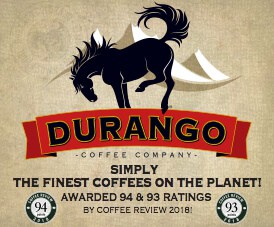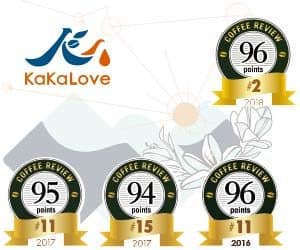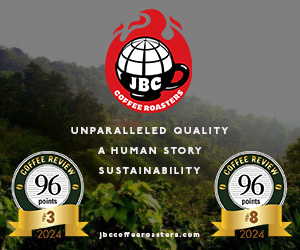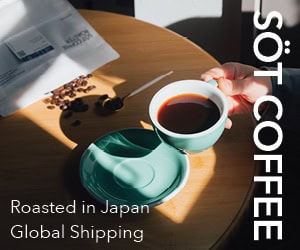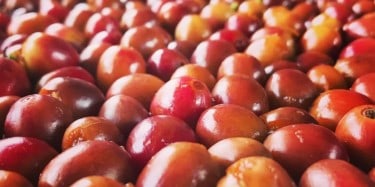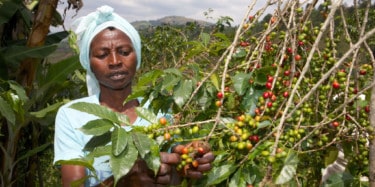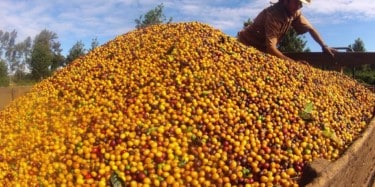The Hawaiian Islands are known the world over for beautiful beaches, diverse microclimates, and both active and dormant volcanoes — pretty much paradise, as the cliché goes. Hawaiian culture is both uniquely American and, in many ways, happily incongruous with mainstream American culture. One island in particular, Hawai'i Island (often called the Big Island), produces the famous, widely
SEARCH RESULTS
Costa Rica Las Lajas Black Honey
Produced from trees of the respected Catuai and Caturra varieties of Arabica at Calle Liles Farm and processed by the black honey method, meaning that skins are removed from the fruit, but virtually all of the pulp is allowed to dry on the beans, often resulting in a deep, pungent profile. Certified organic. Established in 2010, Red Rooster is an organic-certified micro-roaster focusing on
Santa Luzia Brazil
Produced by Jose Oliveira entirely of the Catuai variety of Arabica, and processed by the pulped natural method, meaning that the outer skin of the coffee fruit is removed as it is in the wet or “washed” process, but all or some of the sticky fruit residue is allowed to dry on the bean and later removed by machine along with the parchment skin. Coava is a Portland-based coffee roaster, now with a
Guatemala Huehuetenango
This coffee is organic and certified fair trade, the latter meaning it was purchased from small-holding farmers at a “fair” or economically sustainable price. Produced by members of the (CODECH cooperative) from trees of the Caturra, Bourbon, Catuai and Pache varieties of Arabica. This is a wet-processed or “washed” coffee, meaning the fruit skin and pulp were removed from the beans immediately
Costa Rica Microlot Series San Cristobal Natural
Produced by Danilo Salazar Arias of Finca San Cristobal de Llano from trees of the Caturra, Catuai and Villa Sarchi varieties of Arabica. This is a dry-processed or “natural” coffee, meaning the beans were dried inside the fruit rather than after the soft fruit residue has been removed, as is the case with wet-processed or “washed” coffees. Established in 2009 by Amy and Scott Angelo, Oceana brews
Guatemala Octavio Lopez
Produced at Finca El Durazno by Octavio Lopez from trees of the Caturra and Catuai varieties of Arabica. This is a wet-processed or “washed” coffee, meaning the fruit skin and pulp were removed from the beans immediately after harvesting and before drying. Temple Coffee is a quality-focused retail and wholesale specialty roaster active in Sacramento, California since 2005. Committed to sourcing,
Costa Rica Francisco Ruiz
Produced by the Ruiz family from trees of the Caturra and Catuai varieties of Arabica and processed by the black honey method. With all honey processing methods, some sweet pulp or fruit flesh (“honey”) is allowed to adhere to the beans during drying. In the black honey variation, the beans are subjected to a slower drying process than is the case with yellow or red honey processing. Temple Coffee
Brazil Conquista
Produced at Conquista Farm from trees of the Red Catuai and Yellow Catuai varieties of Arabica and processed by the pulped natural method, meaning that the outer skin of the coffee fruit is removed as it is in the wet or “washed” process, but at least some of the sticky fruit residue is allowed to dry on the bean and later removed by machine along with the parchment skin. Good Coffee Club pays a
Coava Costa Rica Los Nacientes (Instant Coffee)
This coffee tied for the third-highest rating in a tasting of “instant” or soluble coffees for Coffee Review’s September 2018 tasting report. The green coffee was produced by Juan Carlos Saborio Mesen from trees of the Caturra and Catuai varieties of Arabica and processed by the wet or washed method (fruit skin and pulp are removed before drying). This coffee was sourced and roasted by Coava
Costa Rica Tirra Natural
This coffee tied for the fourth-highest rating in a tasting of natural-processed single-origin espressos for Coffee Review’s August 2018 tasting report. Produced at Tirra Estate by members of Coopetarrazu Cooperative from trees of the Caturra and Catuai varieties of Arabica. Processed by the natural method, meaning the beans were dried inside the fruit rather than after the fruit has been removed,
Origin Overview: Rwanda, Burundi, Uganda, D.R. Congo
Origin Overviews is a series of reference articles on prominent coffee regions written by editor-in-chief Kenneth Davids. They are posted regularly in Coffee Review and will appear in print form in Kenneth Davids’ latest comprehensive book on coffee. This Origin Overview focuses on the regions clustered around the African Great Lakes region, and supports our June 2018 tasting report, “African
Minas Gerais Isaias Ferreira No. 2
This coffee tied for the third-highest rating in a cupping of coffees from Brazil for Coffee Review’s May 2018 tasting report. It was produced from trees of the respected Mundo Novo and Red Catuai varieties of Arabica on Isaias Ferreira da Silva's farm Sitio Alvorada do Grotão and is a “natural” or dry-processed coffee, which means the beans or seeds were dried encased in the entire fruit rather
Brazil Pulped Natural
This coffee tied for the third-highest rating in a cupping of coffees from Brazil for Coffee Review’s May 2018 tasting report. Produced on Fazenda Santa Tereza by Isley de Alancar Jr. with assistance from his U.S.-based sister Denise Dubowski. From trees of the respected Red and Yellow Catuai varieties of Arabica. Processed by the pulped natural (the Brazilian term) or honey (the Central American
Brazil Chapada Diamantina Fazenda Floresta
This coffee tied for the second-highest rating in a cupping of coffees from Brazil for Coffee Review’s May 2018 tasting report. Produced by Nelson Ribeiro and Luca Allegro from trees of the respected Catuai variety of Arabica using biodynamic farming methods. A “natural” or dry-processed coffee, which means the beans or seeds were dried encased in the entire fruit rather than after the fruit has
Icamiabas Fazenda Klem Catuaí Natural
This coffee tied for the second-highest rating in a cupping of coffees from Brazil for Coffee Review’s May 2018 tasting report. Produced by the children of Nagipe Viana Klem, founder of Fazenda Klem, entirely from trees of the respected Catuai variety of Arabica. This is a “natural” or dry-processed coffee, which means the beans or seeds were dried encased in the entire fruit rather than after the
Brazil Fazenda São Bento
This coffee tied for the highest rating in a cupping of coffees from Brazil for Coffee Review’s May 2018 tasting report. Produced by Luis Carlos Gomes of São Bento farm, a medium-sized farm in the Sul de Minas growing region, from trees the respected Yellow Catuai and hybrid Icatu varieties. This is a “natural” or dry-processed coffee, which means the beans or seeds were dried encased in the
Coffees from Brazil: Chocolate, Simplicity and Some Surprises
For more than 150 years, Brazil has produced more coffee than any other country in the world. Coffee prices worldwide fall and rise on the slightest whisper of good news or bad news about Brazil’s next coffee crop. Brazil also is among the world’s most technologically advanced coffee producers. Nevertheless, for buyers of high-end single-origin coffees, Brazil shrinks to something smaller than,
Monteverde Costa Rica
This coffee tied for the third-highest rating in a cupping of coffees roasted by women for Coffee Review‘s April 2018 tasting report. Produced from trees of the Caturra, Catuai and CR 95 varieties of Arabica in partnership with Cafe Monteverde in order to benefit conservation, education, and social programs in and around the Monteverde Cloud Forest of Costa Rica. Since 1981 Montana Coffee Traders
Poas Red Honey
This coffee is available exclusively as a part of the Barrington Coffee Curated Collection, four ounces each of three distinguished coffees for $29.95. This selection is produced by Francisca and Oscar Chacon at Las Lajas farm from trees of the Caturra, Catuai and Villa Sarchi varieties of Arabica and processed by the red honey method. With all honey processing methods, some sweet pulp or fruit
Costa Rica Tarrazu
Produced by Martin Urena of La Chumeca Farm entirely from trees of the respected Red Catuai variety of Arabica. This is a dry-processed or “natural” coffee, meaning the beans were dried inside the fruit rather than after the fruit has been removed, as is the case with wet-processed or “washed” coffees. Caffè Luxxe is an Italian-inflected artisan roaster and retailer that emphasizes both its coffee


